

PEEK, abbreviated for Polyether ether ketone, is one of the most versatile and popular injection molding resins. PEEK is a high-performance thermoplastic that has an increased tolerance to gamma radiation exposure. It also demonstrates resistance to sterilization processes such as autoclaving which is why it’s ideal for manufacturing medical devices.
The versatility and mechanical properties of PEEK resin make it an ideal choice for various industries such as medical, aerospace, mechanical, and automotive industries. In this article, we have conducted an in-depth analysis of PEEK injection molding material to help you understand whether it’s the best-suited material for your project.
PEEK (polyether ether ketone) is a part of the broader family of ketone polymers known as PAEK, abbreviated for polyarylether ketones.
PEEK’s chemical name is Poly(oxy-1, 4-phenyleneoxy-1, 4-phenylenecarbonyl-1, 4-phenylene). The following diagram illustrates the chemical structure of PEEK:
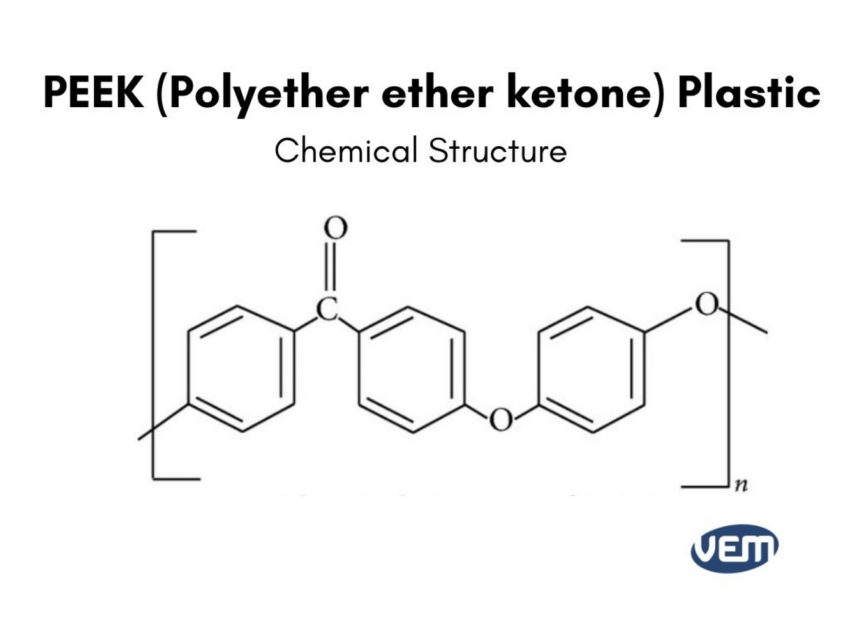
PEEK plastic exhibits excellent physical and mechanical properties. It is highly resistant to chemicals and thermal degradation. PEEK resins hold up well against high temperatures and long-term liquid submersion. In addition, they are also very durable in harsh environments.
PEEK is a versatile injection molding material because the natural grade along with the reinforced varieties offers various properties that can be applied to a wide array of manufacturing projects. There are 4 major categories of PEEK:
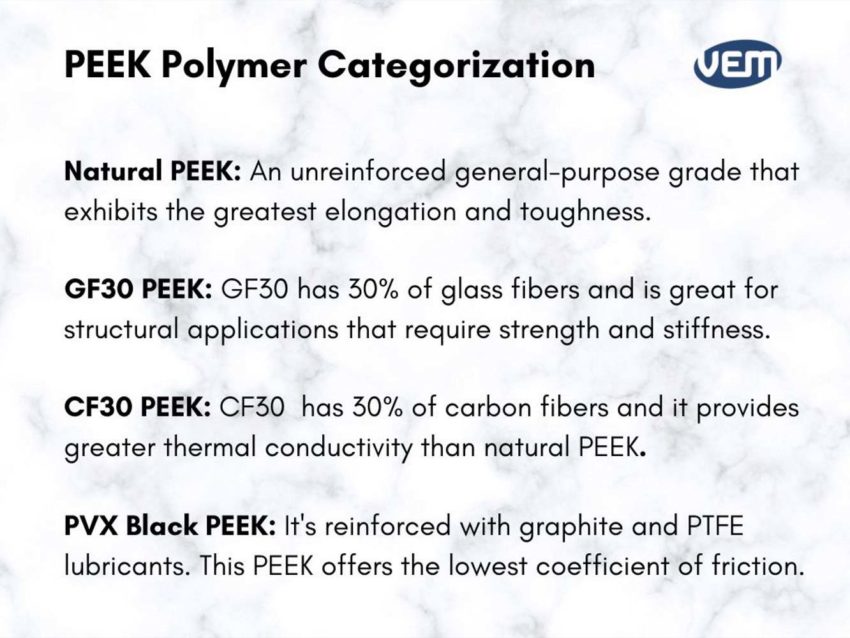
Natural PEEK is an unreinforced general-purpose grade that is wear-resistant. As compared to the other PEEK grades, it exhibits the greatest elongation and toughness.
Natural PEEK is ideal for instrument components where aesthetics is a concern. In addition, it is also well-suited for plastic parts where ductility and inertness are important factors.
GF30 PEEK refers to a type of PEEK resin that has 30% of glass fibers. The addition of glass fiber greatly reduces the expansion rate and increases the flexural modulus of the resin. GF30 PEEK is great for structural applications that require strength, stiffness, or stability, especially at temperatures higher than 148ºC / 300ºF.
CF30 PEEK refers to a type of PEEK resin that has 30% of carbon fibers. The addition of carbon fibers greatly lowers its expansion rate and enhances the compressive strength and stiffness of PEEK. This grade provides greater thermal conductivity than natural PEEK thus, allowing for increased heat dissipation from surfaces.
PVX Black PEEK is reinforced with graphite and PTFE lubricants. This type of PEEK offers the lowest coefficient of friction and the best machinability of all PEEK grades. It is an excellent combination of low friction, low wear, high LPV, low mating part wear, and easy machining thus, making it ideal for plastic parts that are exposed to extreme environmental conditions.
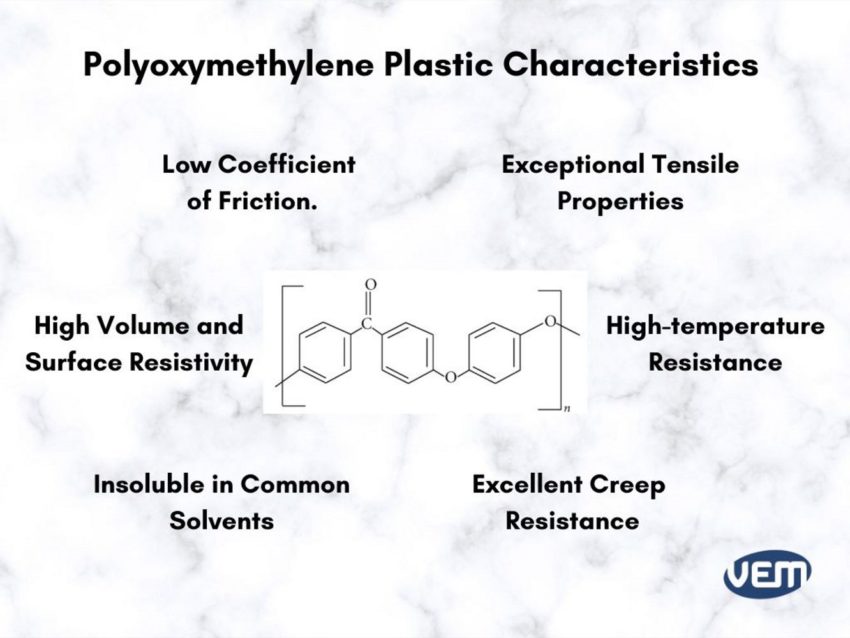
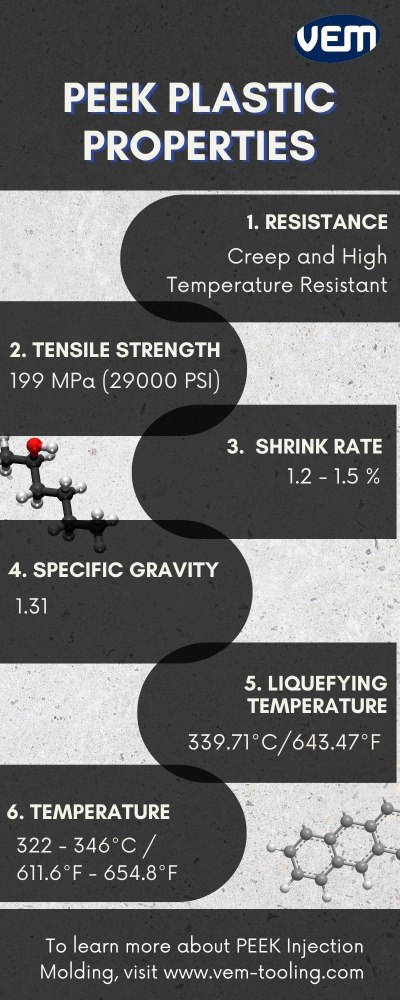
PEEK Plastic is a popular injection material but we must note that it has advantages as well as disadvantages. Let’s understand them in-depth:
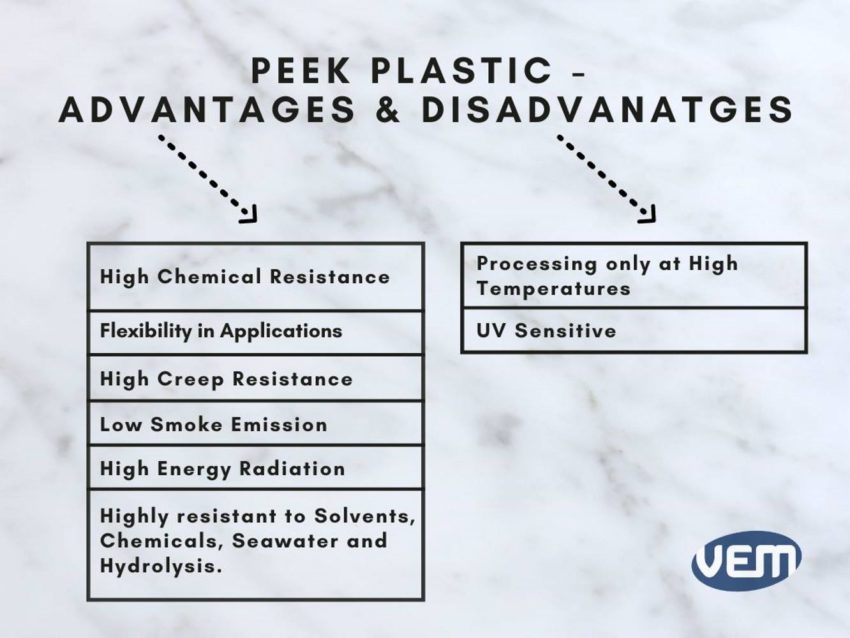
PEEK plastic has distinct mechanical properties. It is thus a popular injection molding material It can be applied to a wide array of applications that include both, industrial and commercial industries. Let’s take a look at some of the sectors PEEK Plastic can be applied to:
Today, more and more metal parts are being replaced with plastic parts in the automotive industry.
PEEK can be machined or injection molded to the nth degree of precision. As mentioned above, PEEK has several grades which makes it ideal for a number of applications in the automotive industry. For e.g. CF30 PEEK’s mechanical properties make it ideal to manufacture car components such as seals, washers, and bearings.
PEEK resins are very popular in the medical industry. PEEK is insoluble in most solvents. They also do not undergo hydrolysis, even at high temperatures. This property along with PEEK’s relative inertness to chemical reactions makes it a perfect resin for biomedical and dental applications.
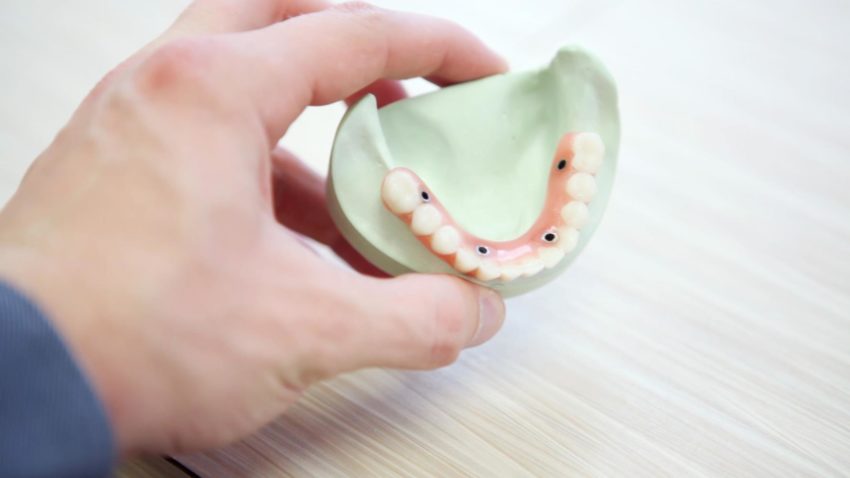
PEEK retains its mechanical properties at high temperatures which makes it an excellent electrical insulator. It thus can be applied to the manufacturing of electrical instruments that operate at high temperatures, such as soldering machines.
Unfilled PEEK is FDA-approved for food contact which is why it has a potential application in the food packaging industry.
PEEK resins meet safety and regulatory compliance and are thus an FDA-approved polymer. PEEK plastic can tolerate chemicals and exposure to extreme temperature ranges. Its often applied in the food packaging industry and in the production of oven parts.
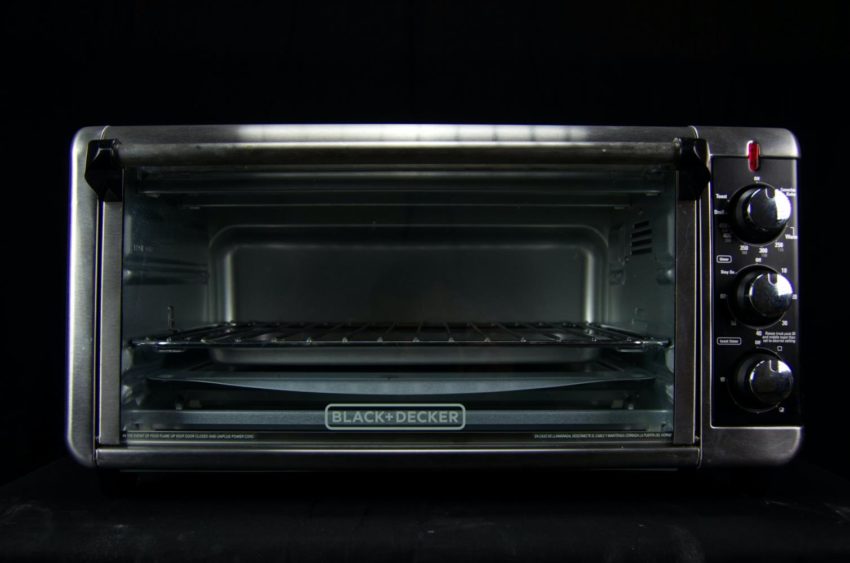
PEEK polymers are manufactured through a chemical reaction known as step-growth polymerization. This is obtained through the dialkylation of bisphenol salts.
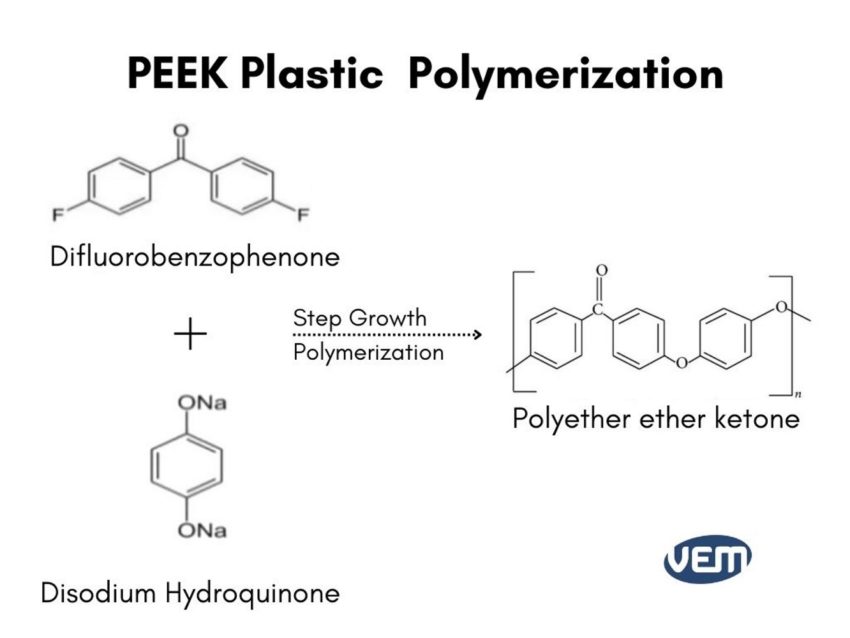
The step-growth polymerization for the formation of PEEK polymers included reacting 4,4’-difluorobenzophenone or 1,4-bis(4-fluorobenzoyl) benzene with hydroquinone. This is done in the presence of alkali carbonates after which the PEEK polymer is isolated. The PEEK polymer is isolated by removing alkali metal fluoride and the polymerization solvent.
PEEK can be processed through injection molding, extrusion, printing and compression molding. You should note that the processing conditions greatly influence the resin crystallinity thereby, also changing its mechanical properties. Let’s understand some of the processing guidelines for PEEK resins:
PEEK resins have extremely unique properties thus, 3D printing of PEEK allows the construction of almost any complex design geometry, which cannot be manufactured using other technologies.
The following conditions are recommended for 3D Printing with PEEK filaments.
PEEK is a very popular thermoplastic however, it is also not always suitable for every application. There are various considerations that one must take into account before applying PEEK resins to an application:
VEM Tooling has the expertise for your PEEK injection molding project. At VEM Tooling, we offer dependable service and ensure that you have a great experience with a seamless manufacturing process.
To better understand how VEM tooling can serve you for your PEEK injection molding project, contact us or request a quote today.